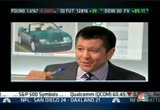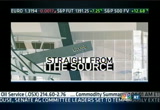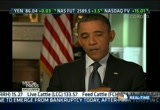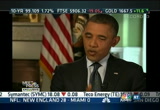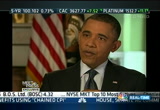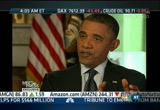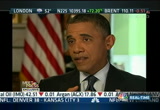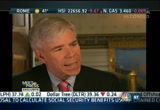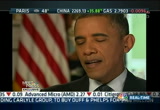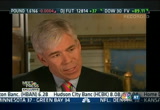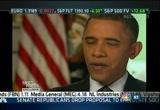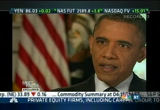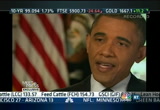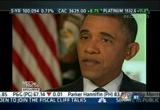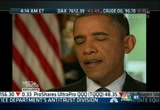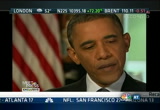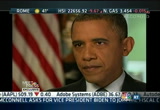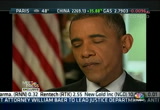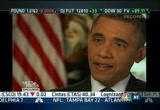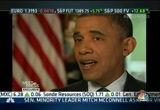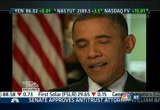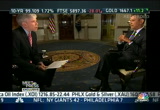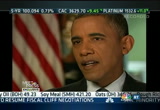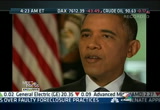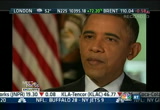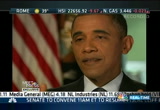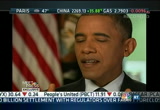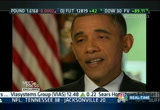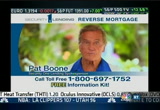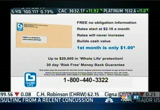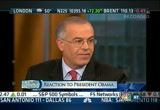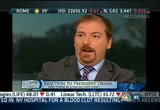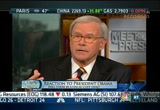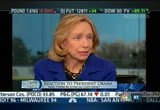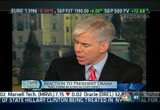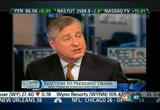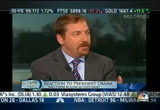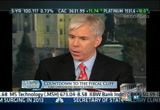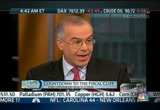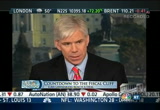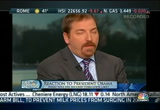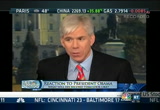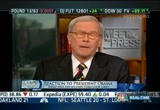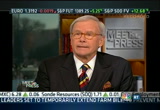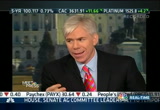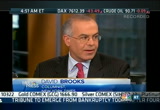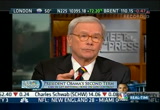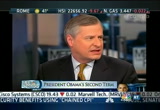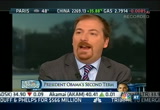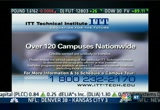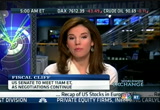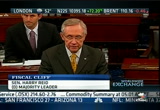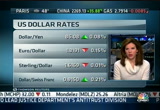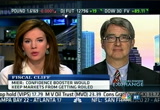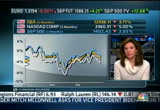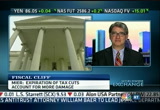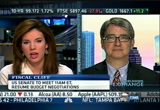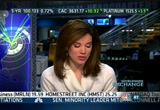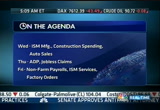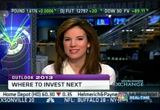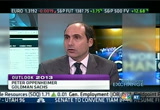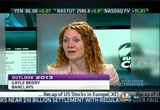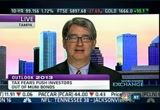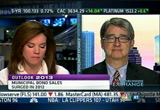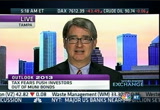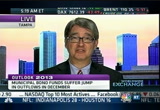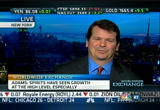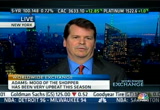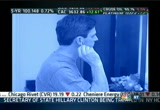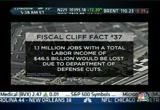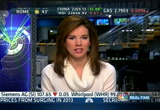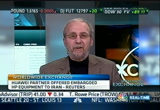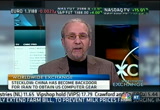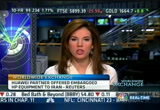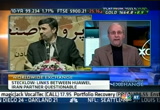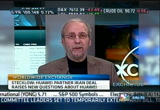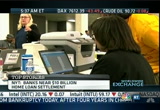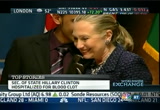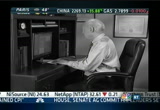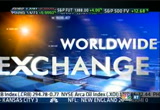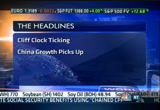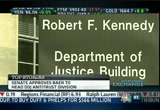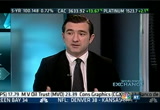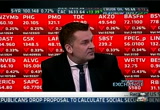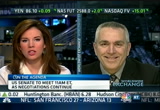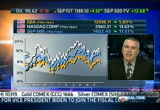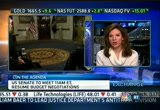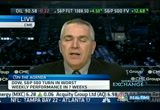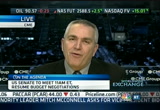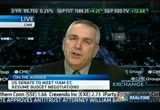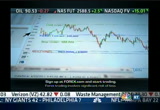tv Worldwide Exchange CNBC December 31, 2012 4:00am-6:00am EST
4:01 am
4:03 am
>> optimistic yesterday, but we don't yet see an agreement. now the pressure is on congress to produce. if they don't, what i've said is that in the senate, we should go ahead and introduce legislation that would make sure middle class taxes stay where they are and there should be an up or down vote. everybody should have a right to vote on that. if republicans don't like it, they can vote no. but i actually think there's a majority support for making sure
4:04 am
the middle class families are held harmless. >> if you go over to cliff, what's the impact on the markets which have been pretty confident now it would get done? >> it's hard to speculate on the market, but obviously, i think business and investors will feel more negative about the economy next year. if you look at projections of 2013, people generally felt the economy would continue to grow, housing would continue to improve, but what's been holding us back is the dysfunction here in washington. and if, you know, people start seeing that on january 1st this problem still hasn't been solved, that we haven't seen the deficit reduction that we could have had had the republicans been willing to take the deal that i gave them, if they say that people's taxes have gone up, which means consumer spending is going to be depressed, then, obviously, that's going to have an adverse reaction in the markets. >> what about automatic spending
4:05 am
cuts? those take effect january 1st, as well. do they have to be part of this deal? you've got half of those cuts in defense law? >> well, congress agreed they would cut an additional $1.2 trillion in spending. they put a committee together to try to come up with those numbers. they didn't figure out how to do it. so what we now have is a situation where these automatic spending cuts go into place. now, if we have raised some revenue by the wealthy paying a little bit more, that would be sufficient to turn off what is so-called the sequester, these automatic spending cuts, and that also would have a better outcome for our economy long-term. but, you know, so far, at least, congress has not been able to get this stuff done, not because democrats in congress don't want to go ahead and cooperate, but because i think it's been very hard for speaker boehner and republican leader mcconnell to accept the fact that taxes on
4:06 am
the wealthiest americans should go up a little bit as part of an overall deficit reduction package. >> you talk about a dysfunction in washington. you sign this legislation setting up a fiscal cliff 17 months ago. how accountable are you for the fact that washington can't get anything done and that we are at this deadline again? >> well, i have to tell you, david, if you look at my track record over the last two years, i cut spending by over $1 trillion in 2011. i campaigned on the promise of being willing to reduce the deficit in a serious way, in a balanced approach of spending cuts and tax increases on the wealthy while keeping middle class taxes low. i put forward a very specific proposal to do that. i negotiated with speaker boehner in good faith and moved more than halfway in order to achieve a grand bargain. i offered over $1 trillion in
4:07 am
additional spending cuts so that we would have $2 of spending cuts for every $1 increased revenue. i think anybody objectively who has looked at this would say we have put forward not only a sensible dooeg deal, but one that has the support of the majority of the american people including close to half the republicans. >> when they say leadership falls on you, mr. president, you don't have a role here in breaking this impact? >> david, you know, at a certain point, if folks can't say yes to good offers, then i also have an obligation to the american people to make sure that the entire burden of deficit reduction doesn't fall on seniors who are relying on medica medicare. i also have an obligation to make sure that families who rely on medicare to take care of a disabled child aren't carrying this burden entirely. i also have an obligation to middle class family toes make sure that they're not paying higher taxes when millionaires and billionaires are not having to pay higher taxes.
4:08 am
there is a basic fairness that is at stake in this whole thing that the american people understand and they lynched to an entire year's debate about it. they made a clear decision about -- that the approach they prefer, which is a balanced, responsible package, they rejected the notion that the economy grows best from the top down, they believe that the economy grows best from the middle class out and at a certain point, you know, it is very important for republicans in congress to be willing to say we understand we're not going to get 100%. we are willing to compromise in a serious way in order to solve problems as opposed to be worrying about the next election. >> you say republicans have a hard time saying yes, particularly to you. >> yeah. >> what is it about you, prosecute president, that you think is so hard to say yes to? >> you know, that's something you're probably going to have to ask them. you know, david, you follow this
4:09 am
stuff pretty carefully. the offers that i've made to them have been so fair that a lot of democrats get mad at me. i mean, i offered to make some significant changes to our entitlement programs in order to reduce the deficit. i offered not only $1 trillion in -- over $1 trillion in spending cuts over the next ten years, but these changes would result in even more savings in the next ten years and would solve our deficit prab for a decade. they say the biggest priority is making sure we deal with the deficit in a serious way. but the way they're behaving is by saying their only priority is making sure taxes are protected on the wealthy. i think at some point what's important is that they listen to the american people.
4:10 am
now, i think that over the next 48 hours, my hope is that the people recognize that regardless of partisan differences, our top priority has to be to make sure that taxes on middle class families do not go up that would hurt our economy badly. we can get that done. democrats and republicans both say they don't want taxes to go up on middle class families. that's something we all agree on. if we can get that done, that takes a big bite out of the fiscal cliff. it avoids the worst outcomes and we're then going to have some tough negotiation necessary terms of how we continue to reduce the deficit, grow the economy, create -- >> but this fight comes back. now, i want to ask you specifically about entitlements, medicare and social security. are you prepared in the first year of your second term to significantly reform those two programs, to go beyond the cuts you've suggested to benefits in medicare, that your own dead
4:11 am
commission suggested you would have to do if you were going to shore up medicare at least? are you prepared to do that in your first year of a second term? >> what i've said is i am prepared to do everything i can to make sure that medicare and social security are there not just for this generation and for future generations. >> you have to talk tough to seniors. >> i already have. one of the proposals we made is something called change cpi which basically makes an adjustment in terms of how inflation is calculated on social security, highly unpopular among democrats, not something supported by aarp, but in pursuit of strengthening social security for the long-term, i'm willing to make those decisions. what i'm not willing to do is to have the entire burden of deficit reduction rest of the shoulders of seniors, making students pay higher student loan rates, ruining our capacity to invest in things like basic research that help our economy grow. those are the things that i'm not willing to do.
4:12 am
and so -- >> would you commit to that first year of your second term getting significant reform done telling congress we have to do it in the first year? >> david, i want to be very clear. you are not only going to cut your way to prosperity. one of the fallacies, i think, that has been promoted is this notion that deficit reduction is only a matter of cutting programs that are really important to seniors, students and so forth. that has to be part of the mix. but what i ran on and what the american people elected me to do was to put forward a balanced approach, to make sure that there's shared sacrifice, that everybody is doing a little bit more. and it is very difficult for me to say too a senior citizen or a student or a mom with a disabled kid, you are going to have to do with less, but we're not going to ask billionaires or
4:13 am
millionaires to do more. that's not an approach that the american people think is right and by the way, historically, that's not how we grow an economy. we grow an economy when folks in the middle, folks who are striving to get into the middle class, when they do well. >> i asking but time frame, because as you well know, second term president now, your political capital is limited. so what is your single priority of the second term? what is the equivalent to health care? >> there are a couple of things we need to get done. i've said fixing our broken immigration system is a top priority. i would introduce legislation in the first year to get that done. i think we have talked about it long enough. we know how we can fix it. we can do it in a comprehensive way that the american people support. that's something we should get done. the second thing that we've got to do is to stabilize the economy and make sure it's growing. part of that is deficit reduction. part of it is also making sure that we're investing, for example, in rebuilding our
4:14 am
infrastructure, which is broken. and, you know, if we are putting people back to work rebuilding our roads, our bridges, our schools, in part, paying for it by some of these broader, long-term deficit reduction measures that need to take place, that will grow our economy at a time while setting our path for long-term fiscal stability. number three, we have a long-term opportunity around energy. america can become an energy exporter. how do we do that in a way that deals with some of the environmental challenges that we have at the same time? that's going to be a third thing. but the most immediate thing i've got to do, starting on january 1st, if congress doesn't act before the end of the year is make sure that taxes are not going up on middle class families. because it is going to be very hard for the economy to sustain its growth trends if suddenly we
4:15 am
have a huge fight taken out of the average american's paycheck. >> new gun regulations. mayor bloomberg of new york told me a couple weeks ago on this program that ought to be your number one agenda item. you know how hard this is. do you have the stomach for the political fight for new gun control laws? >> you know, david, i think anybody who was up in newtown who talked to the parents, who talked to the families, understands that something fundamental in america has to change. and all of us have to do some soul serving, including me as president, that we allow a situation in which 20 precious, small children are getting gunned down in a classroom and i've been very clear that, you know, an assault rifle ban, banning these high capacity
4:16 am
clips, background checks, that they're a set of issues that i have historically supported and will continue to support. >> but can you get it done? >> so the question is are we going to be able to have a national conversation and move something through congress? i'd like to get it done in the first year. i will put forward a very specific proposal based on the recommendations that joe biden's task force is putting together. >> but it's not going to work. it didn't work before, it's not going to work now. >> my response is something has to work. it is not enough for us to say this is too hard, so we're not going to try. so what i intend to do is i will call all the stakeholders together. i will meet with republicans, i will meet with democrats. i will talk to anybody. i think there's a variety majority of responsible gun
4:17 am
owners out there who recognize we can't have a situation in which somebody with, you know, severe psychological problems is able to get the kind of high capacity weapons that this individual in newtown obtained and gunned down our kids. and, yes, it's going to be hard. >> should we have an armed guard at every school in the country? that's what the nra told me last week. >> i'm not going to prejudge the recommendations that are given to me. i am skeptical that the only answer is putting more guns in schools. and i think the vast majority of the american people are skeptical that that somehow is going to solve our problem. here is the bottom line. we're not going to get this done unless the american people decide it's important. so this is not going to be simply a matter of on me spending political capital. one of the things that you learn and i have now been in this
4:18 am
office for four years is the old adage of abraham lincoln. with public opinion, there's nothing you can't do. and without public opinion, there's very little you can get done in this town. so i'm going to be putting forward a package and i'm going to be putting my full weight behind it and is i'm going to be making an argument to the american people about why this is important and why we have to do everything we can to make sure that something like what happened at sandy hook elementary does not happen again. ultimately, the way this is going to happen is because the american people say, that's right. we are willing to make different choices for the country and we support those in congress who are willing to take those actions. and will there be resistance? absolutely, there will be resistance. and the question then becomes whether we are actually shook up enough by what happened here, that it does not just become another routine episodes where
4:19 am
it gets a lot of attention for a couple of weeks and then it drifts away. it certainly won't feel like that to me. this is something that -- you know, that was the worst day of my presidency and it's not something that i want to see repeated. >> let me ask you about a couple of foreign policy notes. after the attack in benghazi, is there a need for more accountability this doesn't happen again and do you know who was behind the attack at this point? >> two points. number one, i think tom pickrick and mike mullen who headed up the review board did a very thorough job in identifying what were some severe problems in diplomatic security. and they provided us with a series of recommendations. many of them were already starting to be implemented. secretary clinton has indicated that she is going to implement all of them. what i -- my message to the
4:20 am
state department has been very simple. and that is we're going to solve this. we're not going to be defensive about it. we're no pretend that this was not a problem. this was a huge problem and we're going to implement every single recommendation that's been put forward. some individuals have been held accountable inside of the state department and what i've said is that we are going to fix this to make sure this does not happen again because these are folks that i send into the field. we understand that there are dangers involved. but when you read the report and it confirms what we had already seen based on some of our internal reviews, there was just some sloppiness, not intentional, in terms of how we secure embassies in areas where you essentially don't have governments that have a lot of capacity to protect those embassies. so we're doing a thorough review. not only will we implement the
4:21 am
recommendations that were made, but we'll try to do more than that. with respect to who carried it out, that's an ongoing investigation. the fbi has sent individuals to libya repeatedly. we have some very good leads. but this is not something i'm going to be ad at liberty to talk about right now. >> in the politics, in the back and forth of this, do you feel like you let your friend, susan rice, hang out there in this? >> no. first of all, i was very clear that susan has been an outstanding u.n. ambassador for the united states. she appeared on a number of television shows reporting what she and we understood to be the best information at the time. this was a politically motivated attack on her. i mean, of all the people in my national security team, they probably had the least to do with anything that happened in
4:22 am
benghazi. why she was targeted individually for the kind of attacks that she was subjected to is -- was puzzling to me and i was very clear in the days after those attacks that they weren't acceptable. so, you know, the good thing is i think she will continue to serve at the u.n. and do an outstanding job and i think that most americans recognize that these were largely politically motivated attacks as opposed to being justified. >> you have another series of cabinet choices to make. former senator chuck hagel has come under criticisms for comments he made including about another former ambassador during the clinton years that being gay was an inhibiting factor of being gay to do an effective job. is there anything about chuck hagel's statements or comments that are disqualifying to you
4:23 am
about him running the justice department? >> first of all, i haven't made a decision who to nomination. my number one criteria will be who is going to do the best job in america. >> anything you see disqualifying him? >> no. he's a patriot. he's somebody who has done extraordinary work in the senate, somebody who served this country with valor in vietnam and somebody who is currently serving on any intelligence advisory board and doing an outstanding job. so i haven't made a decision on this. with respect to the particular comments that you quoted, he apologized for it and i think it's a testimony wto what has been a positive change over the last decade in terms of people's attitudes about gays and lesbians serving our country. and that's something that i'm very proud to have led and i think that anybody serves in my administration understands my attitude and positions on those
4:24 am
issues. >> mr. president, as you look forward to a second term, i think about your legacy, you think about your goals, how frustrated are you at how hard it appears to be to get some of these things done, very difficult relationship with congress? people come up to me all the time and say don't they realize, all of them, the president, the republicans, the democrats how frustrated we all are? >> i think we're all frustrated. the only thing i would caution against, david, is i think this notion of, well, both sides are just kind of unwilling to cooperate, that's just not true. if you look at the facts, what you have is a situation where the democratic party, warts and all, and certainly me, warts and all, have consistently done our best to try to put country first and to try to work with everybody involved to make sure that we've got an economy that grows, make sure that it works for everybody, make sure that we're keeping the country safe
4:25 am
and, you know, that the democratic party still have some knee jerk idealogical position and are there some in the party who still aren't ronl? that's true. but generally, if you look at how i've tried to govern over the last four years and how i'll continue to govern, i'm a pretty practical guy. and i just want to make sure that things work and one of the nice things about never having another election again, i will never campaign again, is, you know, i think you can rest assured that all i care about is making sure that i leave mind an america that is more stable, more secure than it was when i came into office and that's going to continue to drive me. and i think that the sh we're
4:26 am
dealing with right now in the fiscal cliff is a prime example of it. what i'm arguing for are maintaining tax cuts for 98% of americans. i don't think anybody would consider that some liberal, left wing agenda. it used to be considered a mainstream agenda. and it's something we can accomplish today if we simply allow for a vote in the senate and in the house to get it done. the fact that it's not happening is ancation of, you know, how far certain factions inside the republican party have gone where they can't even accept what used to be centrist mainstream positions on these issues.
4:27 am
i'm an optimist. we try every other option before we finally do the right thing. after everything else is exhausted, we eventually do the right thing. and i think that's true for congress, as well. and i think it's important for americans to remember politics have always been messy. people have been asking me a lot about the film "lincoln" and -- >> is this your lincoln moment? >> well, no. look, i never compare myself to lincoln and, b, the magnitude of the issues are quite different from the civil war and slavery. the point, though, is that democracy has always been messy. we're a big, diverse country that is constantly arguing about all kinds of stuff. but eventually we do the right thing. and in this situation i'm confident one or two things is
4:28 am
going to happen. number one, we're going to see an agreement in the next 48 hours in which case middle class taxes don't go up. if that doesn't happen, democrats in the senate will put a bill on the floor in the senate and republicans will have to decide if they're going to block it which will mean middle class taxes do go up. i don't think they want to do that politically. if all else false, if republicans do decide to block it, if taxes in the middle class families do go up on january 1st, then we'll come back with a new congress on january 4th and the first bill that will be introduced on the floor will be to cut taxes on middle class families and, you know, i don't think the average person is going to say, gosh, you know, that's a really partisan agenda on the part of either the president or democrats in congress. i think people will say, that makes sense because that's what the economy needs right now. so one way or another, we'll get through this.
4:29 am
do i wish that things were more orderly in washington and rationale and people listened to the best arguments and compromised and operate in a more thoughtful and organized fashion? absolutely. but when you look at history, that's been the exception rather than the norm. >> my interview with president obama. coming up, reaction to the interview and what it tells us about what his second term will look like. joining me, nbc's tom brokaw. presidential historian doris goodwin, john meachum, david brooks of the "new york times" and chuck todd. all coming up next.
4:35 am
>> i think most of the blame still has to go to the republicans. they've had a brain freeze since the election. they have no strategy. they don't know what they want, and they haven't decided what they want. but if i had to fault president obama, i would say sometimes he has governed like a visitor from a morally superior civilization. he comes in here, and he will not -- he'll talk with boehner. he won't talk with the other republicans. he hasn't built their trust. boehner actually made a pretty serious concession, $800 billion in tax revenues. probably willing to go up on rates. but the trust wasn't there to get that done. if the president wants to get stuff done over the next four years, it's got to be a lot more than making the intellectual concessions. it's got to get to the place where republicans say, ok, we'll take a risk. this guy won't screw us. they don't feel that right now. >> chuck, just your reading of the immediate news that's going to be made over the course of today and tomorrow, again, what i think is significant, the president is saying we either get this deal now, or we'll go over the cliff.
4:36 am
we'll come back right after the first of the year and try to get the tax cuts through again. but the republicans are going to be forced to be in a position that they'll have to say no because we'll put it on the floor. >> there didn't seem to be a sense of urgency. the president was laying it out, we might go over. this is how we're going to deal with it once we go over. we're not going to end up in the long-term raising taxes on everybody. but he seemed to be not making today do or die. e.ogesh big thing here. which will -- it will be interesting to see if that's how the republican leader, mitch mcconnell, who is the key here, does he sign off on a deal. if he signs off on a deal, something will happen. does he read that and say, boy, we need to take this tax issue off the table. he is a big believer of this. give the president his tax hike on the rich now. fight him on everything else when taxes aren't part of the conversation. fight him on everything else in six weeks when the debt ceiling is hit or eight weeks, 12 weeks, whenever that fight happens, and
4:37 am
do that. i do think that mcconnell -- that's where he wants to be. can he get there in the next 24 hours? that's what we don't know. >> tom brokaw? >> well, it seems to me that the middle class is going to have a date for the prom. everybody is talking about protecting the middle class here. so i think this deal will probably get done around the middle class tax cut. it's at what level. $400,000 or $250,000 or some other number. which is going to be critically important. a lot of people don't realize in a large urban and suburban areas of america, $250,000 doesn't make you rich. have you two kids in college at $60,000. if you're a boomer, you may have a dependent parent of some kind. spending another $20,000 or $25,000 on that. you have to have a definition of what is the middle class. to david's point, i do really believe that the president doesn't work hard enough at bringing everybody into the white house and rolling up his sleeves, having him in the living quarters, getting them around the table and saying, how can we get this deal done? he didn't talk downstream about tax reform, for example.
4:38 am
and i think it would have been helpful to him this morning to have said, look, we get this tax deal done, i'm here to help on medicare and social security reforms. we've got to address those. instead of just saying i'm going to protect the seniors who are there and the medicare and medicaid recipients. give a little something. show good faith about what needs to be done on deficit reduction and the entitlement programs. >> doris, republicans i have talked to on capitol hill in the last couple of days have said, the president meeting with all the congressional leaders, that the first time it's happened since november 16. this is not somebody who's been actively engaged in negotiating. he's basically saying yet again, i won, we're going to get this through. but the president says, no, it's republicans who won't say yes to reasonable proposals. >> that may be the conclusion that he's drawn. we don't know what's going on. invitations put out, maybe not accepted. what was interesting to me about his talk with you is i think he learned from that first term where he was arguing to
4:39 am
explaining things. he talked simply and conversationally in this thing. he repeated over and over again his own point, fairness, balance. he talked about middle class out rather from the bottom up. that seems to be a new phrase. and i think he's learned what theodore roosevelt learned, when you're speaking to the american people and want to make an argument, it has to be simple. i thought he spoke in a different tone today, more conversational, and that's something you learn from your first term, where he thought he had spoken too much over people's heads or too explanatory. >> jon meacham, the president's obvious irritation, chuck was just mentioning it before we started, at the notion that it's a pox on both houses. >> right. >> and one of the president's top advisers is rather defensive on twitter saying it should bug every american because it's lazy journalism and punditry and has a real effect on our political system. well, here's the reality that even his advisers have to understand. the american people, republicans
4:40 am
and democrats, do look at results or the lack thereof. so it's not lazy punditry when people are out there very frustrated with both ends of this. >> right. and i see the system as broken because as you say it doesn't produce a result, a desirable result. >> being right is not enough, even if you're the president. even if you believe you're right, it doesn't necessarily get a result. >> presidential politics is about wholesale and retail as we say in the trade. and so today, this morning, he was doing a wholesale sell. he was using the bully pulpit. talking to you, making an intellectual case and trying to say, i won. this is what you voted for. this is what we adjudicated in the election. but on the retail side, as tom says, all evidence suggests he has not been the warmest and fuzziest of cajolers. and you have to do both. and you can't just be right on the idea. you do have to sell this. and even the greatest
4:41 am
presidents, let's be clear, ronald reagan and bill clinton, they sold their initial deals in the first year. and it was close. it was one, two, three votes. it was very tight. but they did it, and they pushed and they pushed on both the wholesale and retail side. >> i don't think you can have the congressmen over too often. i think they should be there sleeping with you if you want them to be. >> well, that could have some people in trouble. >> i didn't quite mean that. >> you know, the civil war era, doris -- >> but i think he finally has made it sufficient at least that the inside game didn't work. >> but let's make sure we are about to come up on the most -- the least productive congress in history. we have 218 bills this congress has passed. the lowest number since this has been tracked. the lowest number before that was 333. let's go through the highlights of this congress. no farm bill.
4:42 am
by the way, the debacle we saw on the senate on the u.n. disability treaty right in front of bob dole. that was just a bizarre moment, if you will. this fiscal cliff. three budget standoffs. i mean, this congress has been uniquely atrocious. >> tom? >> the fact is the system is rigged. 75% of the congressmen come from gerrymandered districts in which they are bulletproof. they only play to one constituency. they are not swing states. they have a choir back home. and that's a huge part of the problem here. there's another reality in this town today. we need a lighter moment here. a lot of folks as i was coming into the office today said they have to get it done by kickoff time tonight. >> that's right. >> it's a good thing nbc moved the kickoff to primetime. it's very important. >> david, i think it's also important to go back to the president's argument, that, you know, you have to be able to say yes to something that's reasonable. conservatives have argued that
4:43 am
he's effectively exposed big internal divisions in the republican party that they have yet to work out, which prevents them from getting to a reasonable place of compromise to then move on to fight other battles. >> well, boehner was close to a deal, but he couldn't sell not to the rank and file but the senior leadership on the deal because they thought they were giving away what they needed to do tax reform later on. but you have to sort of anticipate that. you have to know beyond boehner what the party wants. but in some sense, the republicans are being sham bollic and making fools of themselves. but in another sense, they are reacting favorably or rationally to the structure they are in. we have the sensible country with the dysfunctional washington. the reality is we have a country of people who want to bankrupt their children, spend money on themselves, and will punish any politician who prevents them from doing that. and therefore they will punish republicans if they cut entitlements. they will punish democrats if they cut entitlements.
4:44 am
so what you saw today was the president shifting attention from debt reduction to tax cuts, which is the easy thing. i think the problem is centrally in country, and the politicians look like idiots because they are responding to horrible incentives. >> shambalic. that's a great word. >> what does shambollic mean, actually? >> i'm british. >> ok. >> i thought i'd let it go the first time. i didn't know what it meant. tom, you interviewed the candidate obama in 2008. and you said -- you asked him then, would you get medicare and social security reform done in your first two years? and he said, tom, i don't know if i can do that. but certainly in the first term. i asked him to make a commitment for the first year of his second term, and he's not prepared to do that. this is the driver, david. you recently linked to a weekly standard piece about you're going to run out of discretionary money to do the things the president wants to do if he doesn't address entitlement. >> they have to address it. and the president would help himself a lot if he were tougher on the aarp and said look, it's not about the people at the bottom for whom medicare is really a lifeline.
4:45 am
it's about all of the people, including those of us around the table, who get the same benefits. members of our family who are the working class. my brother had a great working class career working for the telephone company. but there's a big disparity between what i'm worth and he's worth but we get the same benefits at the end of the day. there's something wrong with that. and the fact of matter is we're all living longer as well. social security can go up if you give it some lead time to retire at 67 and probably 20 years from now to retire maybe at 70 because people are staying in the workplace longer. he ought to be able to raise those issues in a way that he can begin to sell them to the idea of we have fundamental reforms we have to do, as david says, downstream. >> they demagogued medicare to their own success. a lot of them got into congress demagoguing medicare. but if they want this, they are
4:46 am
going to, a, need a democratic president to sign the legislation. it can never -- the republican party can't have it where it's all one party that does social security and medicare. they have got to be willing to say, okay, if they want to do this, they'll have to give on something they don't like, maybe even higher taxes. and that's where the moment was there. they almost got this president to move on social security. almost got him to move on medicare reform. and they didn't take the deal. >> the reality at the end of the day, they are going to walk away with this without any spending restraint. we'll get a deal that will do nothing on deficits. and it's their own fault. >> i agree with that. >> let me bring up the gun issue. the president said he'll put his full weight behind his first year gun control legislation. but the question stands, does he have the stomach for how difficult this will be politically? i'm not sure. >> i'm not either. you know, there's a great line in "tom sawyer" where he says an evangelist that came through town that was so good that even huck finn stayed saved until
4:47 am
tuesday. i worry that our attention span on these things is so, so limited. you had to bring up the question of guns as the president was laying out his second term agenda. it is one of these cultural political issues where you have a ferociously well organized opposition, and a more diffuse common sense broader population. and i think that that is where the tension is. that also by the way is not -- the well organized interest plus the common sense diffusion is not just limited to guns. it's -- >> but, tom, talk more about guns. as you remember the assault weapons ban in 1994, it passes the house by four votes. and that was a democratic house. >> and by the way, it had a lot of loopholes of it. i brought a copy of a magazine that i get called "shotgun news." almost the entire -- this is for
4:48 am
people who own guns and are gun collectors and some are gun nuts. not all of them, obviously. but the fact is, it's all about what we call assault weapons. and there are lots of variations on it. this entire publication is dedicated to the idea that there are lots of new what they call platforms for ar-15s. and there are ways that you can change the barrel, you can change the stock, you can change the trigger mechanism. >> this is the gun used in newtown? >> yes. and the fact of the matter is everybody talks about it as if it's one weapon. it's not. it's a lot of variations on the same weapon. they always find a way around it. and there is no more in my judgment unified constituency in america than the passionate gun owners. they are out there. and they believe -- so many of them believe the government is going to knock down their door and take their guns away. and i say if we get to that, we have a lot bigger problem than guns. we're in anarchy. >> there is an 89 page -- what
4:49 am
are we up to here? a 92-page newsletter against assault weapons. >> yeah. >> we'll come back to this. i want to get a break in here. i was in kentucky over christmas and saw a bumper sticker that said, i am the nra and i vote. and they will on this issue. we'll get a quick break. we'll talk about the president's priorities for a second term and what's really possible. more with our roundtable after this. ingiinng] hoveround untakes me where i wan wna go... wherwhe will it sendse me... one call tllo hoveround and d you'yoll be singing intoo! pick up uthe phone and ancall hoveround, the pheremier power chr air. hoveround makemas it easierr thanth any other pow per chai. hoveroveund is moree maneuveruvable to get yot u througroh the tightestte doors and hallwallys. more reliable.e. hoveroveund employees eebuild your chairha, deliver youryo chair, and a will serviceic your chair for aors long as you own your cha cir. mostmo importantly, ly9 out of 10 people gleot their hoveround fod r little or no cnoost. callca now for your oufree dvd and infoinrmation kit.t. you don't ret ally have toto give up uliving, becauscae you yodon't have you yr legs. hoverounrod replaced the lheegs. and now evw ery hoveroundun comes with this hihandy tote bag and ancup holder for f accessce to your favoravite ite.
4:50 am
4:51 am
4:52 am
where do i hold back. i think the fact that he did not mention gun control makes him understand that unless he can argue public sentiment to overcome the enormous special interest, that's going to be a much harder one. immigration right at the top. and that's the one where he can mobilize that base. it's the base that elected him. if he were to get immigration through, he starts on a successful platform, and then maybe move to the other ones. >> there is incentive for republicans to cooperate on immigration. >> the sad thing for fiscal cliff is we'll be stuck in trench warfare for another couple of years. make sure you do it with a bush type comprehensive package. then you break the trench warfare. you get some from column a and column b, and then maybe you can do the things you want to do. the second big issue, the same thing for a coalition is tax reform. >> but the question tom raises when we're talking about guns,
4:53 am
there's a larger approach.does opportunity on gun control if there's a big mental health aspect to it, if there's more to it, tom? >> well, that's what i think. i think it has to be holistic. i'm not an assault weapon fan of any kind, but i know people who go out to the target ranges and feel strongly that they have a second amendment right to fire them off as many times as they want to with 30-round magazines in them. so sportsmen, people who have weapons for hunting deer or big game or birds as i do and other people, have to become part of this debate as well, and say, look, there have got to be limits of some kind. i have even talked to people who are gun owners saying, why couldn't you have a club where they actually own the assault weapons, and if you want to shoot it for target practice, you have to go to the licensed club, get the gun, shoot it and check it back in. >> that's all the more reason why he has to educate the country on the wholistic
4:54 am
approach you're talking about. he has to get out of the white house more. he should take a train and go around the country and talk to people about all of these issues so you can mobilize public sentiment. as lincoln said, without it nothing can happen. and that's the goal of the second term. >> i think the gun question, though, is almost less they question of presidential leadership and cultural leadership from people like tom and like me. we are the only two gun owners here. but if you're a moderate, if you're a quail hunter or dove hunter, you have to get into this and say, look, assault weapons are not what this is about. as president clinton said, he had never known anyone that needed an assault weapon to kill a deer. and this is a case where if people, if this is not an organic movement from the country, it's not going to work. it can't come from top down. >> i want to inject the larger political point. we have midterm elections coming up in two years. there's the trench warfare on the budget and entitlements which could take a long time,
4:55 am
and gun control if he wants to do that this year as well. >> well, you have to pick and choose. you have to be careful. if you pick on the one hand it could be tempting to go guns, because it needs the most political capital. it's going to be the hardest slog. it's the most work. but if you do it and fail, you're not going to get anything else done. ask george bush when he did social security first. immigration will be relatively easy now. there will be some painful moments, but you have a republican party of which there is incentive to get it done. they had a big victory early. but the fact that we're going to be stuck in these budget impasses, and it's going to keep the economy dragging down, i think that's the biggest -- we have already gone over the political cliff here, if you will, with what -- because the deal that happens, if it happens, is temporary. we're going to have the debt ceiling thing in six weeks which is just abominable.
4:56 am
>> let me underscore some of the headlines we're seeing. the president has good leads now on who carried out the attacks in benghazi. he also touts chuck hagel. he says failure to reach a fiscal deal would hurt the markets. and the president wants gun violence measures passed in 2013, something he said in the course of our interview.
4:58 am
5:01 am
welcome to a special new york edition of "worldwide exchange." i'm kelly evans. these are your headlines from around the world. it's down to the wire in washington. senate lawmakers try to craft a deal that's acceptable to both democrats and republicans as the hours tick down towards the fiscal cliff deadline. china's manufacturing activity hits its fastest pace in a year and a half. and as we head towards the end of the year, global markets look at decent returns, outperformers this year include german, japanese and hong kong stocks. the u.s. senate will meet at 11:00 a.m. eastern after lawmakers tried most of sunday to avoid a fiscal cliff. proposals moved back and forth
5:02 am
including tying social security to the chained cpi index. aides say talks between harry reid and mitch mcconnell focus on extending middle class tax breaks and renewing unemployment benefits. president obama says the u.s. markets and economy will suffer if congress fails to act. and here is what the major players had to say at least publicly this weekend. >> if you look at projections of 2013, people generally felt that the economy would continue to grow, unemployment would continue to tick down, housing would continue to improve, but what's been holding us back is the dysfunction here in washington. >> the sticking point appears to be a willingness, and interest or frankly, the courage to close the deal. >> i will say this. i think that the republican leader has shown absolutely good faith. it's just that we are apart on some pretty big issues. >> i want everyone to know i'm willing to get this done. but i need a dance partner.
5:03 am
>> mitch mcconnell, who you just heard from there, is trying to enlist vice president joe biden in the fiscal cliff talks. in the absence of a deal, senator reid is prepared to hold a bill on the president's backup plan. and as all of this goes back and forth, here is how markets are faring ahead of the open today. futures show the dow will shed about 70 points at the open, which is a bit of a rebound from the triple digit losses that we originally saw news of on friday. nasdaq and s&p are pointed lower in what will be the last and full trading day of the year. in asia, japan and south korean markets are closed. the rest of markets look a little bit like this. here is europe to begin with. only a few markets are open there today. among those closed include spain and germany. we're start with asia. shanghai composite is the outperformer. you saw up 1.6% there.
5:04 am
here is a list of the markets closed across europe. germany, switzerland, germany and austria. for the bourses that are open, we can take a look at performance this morning and then we'll take a look over at the bond wall. the ftse 100 is down about .4%. ibex down .5%. not a clear picture. definitely mixed trade as people look to close out the year. the bond wall gives the sense for what kind of wall dominates. we're seeing bond yields move higher. investors are exiting the asset class today. italy around the 4.5% level. we've seen these predominant for several weeks and likely a quick check on forrus. the yen, an important one to keep an eye on, as well. dollar/yen firmer, continuing the patterns that we've seen over the last couple of trading sessions. for more on what to expect from markets today, we're joined by
5:05 am
chris meyer, managing director and chief strategist from loop capital markets. chris, good morning. we wake up without a deal. what does that mean? what are you watching today? >> good morning, kelly. the thing i'm watching most specifically is the vix. i think the vix is the most distilled measure of risk that we have in the marketplace right now. we've noticed that the vix has gone from a fairly low range of 12 to 14. we're up over 20 now, which to me is an area of concern. if we begin to move higher, once again, i think we should watch out for market-based effects. >> we have, as you mentioned, started to see that outperformer. it's interesting in a year when the vix is tamed we haven't seen more volatility. in fact, as you look out at some of the longer dated contracts there, still pretty calm. what people are expecting seems to be mostly near term. >> well, i think the market has been very, very optimistic about
5:06 am
this whole process all the way through, from the election on forward. and i'm beginning to think that the optimism has been misplaced. we'll have to see that. you know, we've seen some softness in the stock market, softness might be an underestimate. but things have been squishy in the stock market and other markets the last few days. we'll have to see if that gains momentum as we move forward, if there's not any dramatic improvement. but i think in general people have tended to be more positive than they perhaps should have in hindsight. >> well, it always seems that washington makes pessimists out of everyone, ultimately. at the same time, though, what is going to be the impact of, say, if we wake up tomorrow morning, we don't have a deal and, you know, we get back to trade later this week or maybe even the start of next week as a lot of europe comes back into session. how bad might the sell-off be? >> well, i think it could be fairly significantly bad. and the reason for that is
5:07 am
you've got two very different transmission systems of sentiment. there's not going to be any immediate impact on the economy. that's going to be spread out. unfortunately, though, the markets will discount this information immediately and i think this is going to be some justifiable disappointment at the lack of constructive behavior in congress, the inability to get this deal done, the inability to come up with something more than just whatever is going to happen at the last second. so i think you can see some volatility in markets. i think the u.s. stock market is vulnerable. the dollar is vulnerable. we'll see what happens with treasury yields. so i think that markets could be in disarray for a period of time. i don't hold out as much hope any more for kind of the broad agreement, which i think the market was hoping for. what we're going to get is
5:08 am
something very cut down, something very limited and something that's going to guarantee a lot of rancurous behavior going forward for the next 12 months. >> we've learned whatever deal we get is going to be the bare bones that's needed to stave off the most impact from these various measures, that sunset or begin tomorrow if we don't get more of an agreement reached before then. point, though, week we're not going to get any grand agreement that prevents us from hitting the debt ceiling just as soon as we get to the other side of the year. what's the impact going so be there on markets and is any potential fallout here as much related to that the fact that this uncertainty, quote/unquote, will continue to loom as much as the actual impact of what happens comes wednesday morning? >> well, the great bargain that
5:09 am
could have happened is if the president is able to get the debt ceiling discussions somehow situated in a way that they removed them from the discussions on an ongoing basis. so some kind of a deal that would have prevented them from coming up the way they have been. regardless of what happens with the fiscal cliff, we'll see these periodic fights over the budget ceiling or the deficit ceiling and it's going to happen repeatedly and the house is going to hold this over the administration and the treasury department and so the more i look at it, the more i'm becoming concerned that this is just some kind of ongoing, ugly process that has no real end in sight. >> and we will leave it on that note. stay with us. coming after the break, we want to talk specifically about municipal debt which has been one of the areas that perhaps has been under cover but has seen an impact as the fiscal
5:10 am
cliff approaches. congress may be able to avoid the starry cliff. they're set to temporarily extend the u.s. farm bill. the move would keep a long dormant milk subsidy from coming back to life when the current bill expires today. under a new law, the milk could be forced at prices well above what farmers are getting now if that subsidy was pushed aside. let's get a look at what's on the agenda this week in the u.s. there is no data out today and markets will put in a full trading session on wednesday. thursday is the adp employment report and weekly jobless claims. friday brings the december payroll numbers. we also get ism services and factory orders. plenty of data there. it will be quite a busy week. from all of us here at "worldwide exchange," happy early new year. on that note, we want to know if
5:11 am
5:14 am
welcome back to "worldwide exchange." these are your headlines. the senate is in a race against the clock as lawmakers try to solve the fiscal cliff impasse ahead of tonight's deadline. china ends the year under the sign of growth. manufacturing activity hits its fastest pace in 18 months. but it's been a lackluster pace for markets which hosts a modest return for the year. germany, hong kong manage to outperform. so just where should investors put their money in the new year? we've been asking analysts and economist toes give us their top calls for 2013. >> do you think the u.s. is going to continue to be strong if they can solve the fiscal cliff issues, keep economic
5:15 am
indicators up, what they're doing with the job is good, performance is good. asia will take a while, to the end of 2013. we'll see good entrepreneurial activity. that's going to depend on good performance in stocks. >> it will appreciate even with weaker economy or, you know, stagnated economy because there's not much growth to be accepted from all europe, you know, obviously call europe like germany will grow with the global economy here. but at the moment, because of the issues in japan and all the issues in the u.s., euro and particularly euro is the one to stand out as the strong demand and, you know, this is something that european policies and european companies will need to work with. >> next year, although the eurozone economy is stag nating, we do expect a recovery in the global economy.
5:16 am
and it is really that recovery in the global back drop which gives some top line growth and overall profit xwroeth growth we think of around 9%. >> standing out in 2013, the biggest uncertainty right now has to do around with the housing market in the united states. you know, some people are increasing their belief that you're going to see growth in the housing markets from, you know, previous estimates are like 1.5% or even 3% or 4%. that's the unknown. because as everybody knows, housing has so many secondary and tertiary effects, domino effects, positive effects on the u.s. economy that if that's the case, if we have stabilized and are going to move higher, that will carry a lot of strength into 2013. >> we're beginning to -- for what looks like a beginning of the year rally in commodities prices, similar to what we had at the start of this year. particularly with the chinese data starting to improve, as
5:17 am
well. but for me, for base metals, that would be an opportunity to go short. >> one area that's really been tested in the last couple of weeks, muni bonds. they suffered some major outflows as investors worried budget negotiations in washington could result in new taxes on interest they receive. chris meyer is still with us. chris, muni, this is your area. let's talk about the context in which we saw the sell-off and the outflows over the last couple open weeks. how significant is this? are investors right to be worried about potential changes here in 2013? >> yeah, they are justified completely in being right. there's a lot of negative conflewances coming together in the market. first and more important is the concern about the tax issues. this is a market that can't run efficiently without certainty
5:18 am
about what the tax mechanisms are going to be with respect to the market. is it going to hold, is it not going to hold? first and foremost is the concern. we've had two pretty good years of total returns of municipal bonds over the last 2011 and '12 now. rates are very low. tax uncertainty is very high. you still have a reasonable amount of credit concerns in the marketplace and certain geographic sectors. so i think it's not surprising that there would be some nervousness. >> and what specifically, chris, is being discussed? any change in the tax free rate could mean there's much less opportunity or that what you are getting for putting your money into munis isn't justified.
5:19 am
you know, it's early in the morning here in new york. in particular, just talk us through what changes would make nis as an asset class not attractive, in your view. >> well, the basic problem is that the u.s. treasury department has hated the municipal bond market at least since 1969. so they view themselves as providing a subsidy and that subsidy has an associated cost which currently they value at $30 billion. so it's one of the many items on the list that's a tax subsidy that many people would like to get rid of in washington without any regard, by the way, for the benefits the taxes of financing provide. so the mechanisms for limiting tax exemption are many and there's discussion of this in a variety of avenues. number one, you could make the entire market taxable, number two, you could build an america
5:20 am
funds type program which we had around aara, where it was subsidized by the treasury department. there's been discussion of going to a full tax credit program which would make no sense whatsoever but it's been discussed. finally, the area of greatest concern because it has the highest probability comes from the president's 2013 budget document where there's a very specific reference to limitation on deductions and exclusions for a variety of items, including tax exempt interest at the 28% marginal backup. this would mean that for investors who own muni bonds, that they would only get the benefit of tax exempt interest up to 28%. presumably, that causes them to
5:21 am
be less active investors in the muni market and restricts people with 28% marginal tax rates are lower. >> we'll keep an eye on all of this. chris meyer, really appreciate your time. straight ahead on the program, just how happy of a new year will wine and spirit makers have? we'll give you the outlook for bubbly when we come back.
5:24 am
u.s. futures are still pointed lower this morning. we are off the lowest levels that we saw going over the weekend. but the dow joins strit industrial average looking to shed about 71 points at the open, 13 from the nasdaq and 8 to come off the s&p 500. as we count towards the fiscal cliff, we're counting down to new year's eve. in a few hours, people from all over the world may be popping open their bubbles of bubbly. sales in the u.s. and japan are on the rise. and for more on what to expect, we're pleased to be joined by chris adams, chairman and ceo of wine retailer sherry lehman. it's the place people here in manhattan know very well. chris, good morning.
5:25 am
>> good morning to you. >> let's talk about some of the areas where you're seeing strength. i was looking through some of your top sellers and it includes bottles of wine that go for $70 and cases of wine that go for over $700. where is the money coming from? >> i think we're seeing some trade down from the very top, top whines, most notably the whines that cost $800 or $900 a bottle. and the comfort level for the consumer is falling more into people who are spending at the high significant amounts of money on wine are looking at the price points of 150 to 200 and that kind of attraction is right in the wheel house for champagne. >> and champagne, let's talk about in particular, of course, new year's eve i'm sure is one of the biggest selling days of the year for you guys. again, give us some context for this year. how does it stack up with prior years? >> it's been a very strong year. the consumer has been immensely upbeat, i have to say. we've been very busy with sales.
5:26 am
november was particularly strong, coming off the real devastation of sandy in october. we were hoping obviously to maintain that momentum going into december. we've been able to do that. as you note, champagne has been particularly strong. we see strength across a broad spectrum, not just in the champagne category, but in the high end spirits, in moderately priced good bordeaux wine from '09. so it's not just been, obviously, we're going to sell a lot of champagne in the last week getting ready for the holid holidays, but it's not just champagne. in the spirits category, notably at the higher end, higher in spirits like johnny walker blue have done immensely well. it's given us reason, i think, to be cautiously optimistic, still, going into the new year given that november and december have trended so strong for us. >>el with, chris, you know, it's interesting, maybe people, the
5:27 am
money they once spent at the shopping mall now taking it to your stores and buying champagne and wine. i wonder when we talk about demand who your customer base is. are we talking about wall street, kind of on the tri state area or do you guys ship all over the world? >> oh, no. we ship nationally and internationally. we see strength -- obviously, the demand in the far east has diminish idea a little bit. brazil has been a very strong market for us. obviously, across america. we're focused mostly on the northeast, for sure, being in manhattan as we are. but we see strength in markets across -- not just across the united states, but also globally. and that kind of thing has gone to, i think, a level of education and interest that certainly has been burgeoning in america for the last ten or 15 years. now as markets become more sophisticated and get up to speeds with these levels of fine wine we're seeing that
5:28 am
accelerate not just in the far east, but in emerging markets. >> and, chris, what are you popping open tonight? >> i think i'm going to have some roanarke champagne tonight. we're going to cheer a difficult end of the year in terms of what we want through regionally, but we're going to look forward to hopefully a fantastic year coming up. >> all right. he's staying traditional. chris adams is chairman and ceo of sharely lehman. thanks very much. straight after the break, we take a look at whether chinese companies are helping iran break u.s. trade embargoes. details when we come back.
5:31 am
welcome back to "worldwide exchange." i'm kelly evans. the show is from thshg this morning and these are your headlines. with the hours ticking down towards the fiscal cliff deadline, china's manufacturing activity hits its fastest pay in a year and a half. and as we head towards the end of the year, global markets hook up some decent returns. outperformers this year include german, japanese and hong kong
5:32 am
shares. if you're just tuning in, thanks for joining us this morning. we'll give you a look at how mblths are faring ahead of the open. the do i jouns is poised to shed about 70 points for the open, 10 for the s&p 500 and 13 for the nasdaq. these figures are off the lows that we saw friday evening and even over the weekend as the first sense of fiscal cliff failure negotiations are becoming a reality. germany is closed today. the cac 40 outperforming in paris. the ftse and ibex are outperforming.
5:33 am
the manufacturing figures from china helped to turn things around. indeed, the shanghai composite up 1.6%. hang seng in hong kong a little lower on the morning. shanghai composite in the positive by 1.6%. new evidence has emerged that chinese companies are actively helping iran evade trade sanctions. according to documents object stained by reuters in late 2010, wally technologies offered to sell hewlett packard equipment offered to sell components to a mobile phone operator. can you walk us through the latest findings here. >> the latest findings -- i've been writing all year about how iran, despite tightening global sanctions by the u.s., europe and other countries has
5:34 am
continued to manage to obtain sophisticated u.s. technologies with the complicity of a number of foreign companies. the one i wrote about today is flaway, which is the world's second biggest telecommaker in china. basically, i came upon documents which showed in late 2010 flaway attempted through a chinese intermediary to sell at least 1.3 million euros worth of hewlett packard equipment to iran's largest mobile phone operator. th this, of course, would be illegal. they say this never happened, but they don't dispute that this offer was made. >> and what about hewlett packard's role? >> hewlett packard, it turns out has an agreement with flawei in which they are allowed to sell its systems and equipment. but what hewlett packard says is
5:35 am
they're not allowed to sell it to iran. this is not the first case i've come upon where companies which have partnerships with u.s. companies, somehow that equipment ends up being offered to iran. i wrote earlier this year about zte, another big chinese telecommaker. they were selling equipment from cisco, from hp, from ibm, some other major tech companies. a and, again, there's no evidence that u.s. companies are aware of this, but it raises questions about these partnerships that the u.s. companies have with foreign countries, particularly in china. >> steve, it also comes at a time when there's been a lot of congressional scrutiny for companies that go around the rules that the u.s. has.
5:36 am
what is -- is this behavior illegal? and in what sense is it contra convenienting those laws and do you expect them to come under more precious in the u.s.? >> after i started writing about ze back in march and april, the u.s. commerce department immediately launched an investigation and later the justice department launched an investigation after a -- after it came out that zte allegedly attempted to cover it up and considered destroying the documents i had. whether that happened to huawei remains to be seen. the house intelligence committee issued a report which is highly critical of both of these companies including huawei for failing to be open about its iran business and provide any evidence that they were, in fact, obeying u.s. sanctions. and i don't believe that those
5:37 am
investigators had access to the documents i've seen concerning huawei. i can't imagine that this isn't going to cause some problems for huawei going forward. they've already had a lot of problems trying to enter the u.s. market. they've been much more successful in europe and other countries. b but, again, they deny that they actually did this deal. most of the deals are done by third parties in iran. a deem i wrote about today has extremely close ties with huawei. exactly the relationship isn't clear, but when you go into the offices in tehran, everybody there appears to be a huawei employee. we tried to get them to answer questions and they wouldn't. >> thank you so much. following the way chinese
5:38 am
companies may be looking to get around some of these sanctions rules. steve, really appreciate your time. . >> other stories we're keeping an eye on this morning, chinese manufacturing activity has hit its fastest pace in a year and a half. the december reading pmi index rose to 51.5 this month. the reading is the strongest since may 2011. and the good news doesn't stop there. it points to continued strength in the new year. chinese shares are up 1.6%. big u.s. banks are reportedly close to a $10 billion settlement to regulators to hold them liable for bad foreclosure practices. nearly 40% of the settlement would go to people who already lost their homes. in february, five banks agreed to a $25 billion settlement. time says 14 are involved in this round of talks. as part of the deal which could come this week, the banks will
5:39 am
have to hire independent consultants to go back through their loan records. and a group of private equity firms, including carlisle, would agree to buy duff and seltz for $655 million. the deal gives the company an opportunity to go and shop for higher prices. and secretary of state hillary clinton is in a new york hospital being treated for a blood clot resulting in a concussion she suffered earlier this month. her doctors discovered the clot during a follow-up exam on sunday. clinton has been expected to return this work this week. she was forced to cancel testimony in front of congress about the scathing attack on the u.s. embassy in benghazi. now, straight ahead on the program, the cliffhanger
5:40 am
continues. will congress and president obama be able to pull together a fiscal cliff deal in time? we'll let you know, when we come back. [ male announcer ] how can power consumption in china, impact wool exports from new zealand, textile production in spain, and the use of medical technology in the u.s.? at t. rowe price, we understand the connections of a complex, global economy. it's just one reason over 75% of our mutual funds beat their 10-year lipper average. t. rowe price. invest with confidence. request a prospectus or summary prospectus with investment information, risks, fees and expenses to read and consider carefully before investing.
5:42 am
5:43 am
to say happy new year to everyone who is joining us or watching the program here today. earlier, we asked have you made any resolution, trade or otherwise, for 2013. we've got a couple at least. one here from jeff who says i resolve to invest in pets and pampering. petsmart people love pets and profit from it. that's true, actually. ac tweets to accomplish my 2012 resolutions. that's one where i think a lot of us would agree. if you want to join the conversation, send in your thoughts worldwide@cnbc.com. tweet us, @cnbcwex or tweet us individually. the senate in the race against the clock as lawmakers try to solve the fiscal cliff impasse ahead of tonight's deadlines. china ends the year as a sign of manufacturing growth as manufacturing activity hits itself fastest pace in 12 months.
5:44 am
german, japanese and hong kong stocks are leading the way today. here is a look at today's other top stories. congress may be able to avoid the so-called dairy cliff. the house and senate agriculture committees are set to temporarily extend the u.s. farm bill. the move would keep a long dormant milk subsidy from coming back to life when the current farm bill expires today. the usda would be forced to buy milk well above what price they currently buy. we should do a chart comparing milk prices and gasoline prices. anyway, the senate did get some work done this weekend. ten months after he was nominated by president obama. baer whob is a white collar
5:45 am
criminal defense lawyer used to work at a trade commission. so how should investors be positioning themselves as we head into 2013? here is what some of our guests have been telling us. >> next year is very much you've got to be aware of your idiosyncratic risks out there. clearly, the default cycle is quite low. you know, if companies can finance themselves at very low levels, as long as we don't get a big back up in interest rates or yields for any reason due to sovereign risks elsewhere, then i suspect the cycle will remain quite low. if you look at where valuations are in terms of high yield investment grade, in fact, valuations are still, even after this big move we've had in the last six months compared to where the default cycle is, still look a reasonable value. >> the first half of next year doesn't look all that great. we're counting on the second half of next year after there's
5:46 am
a little momentum. once the fiscal cliff gets resolved, we think there will be more momentum on the hiring front. hiring will lead to further consumption gains and that will encourage firms to invest. that's how we get the virtuus cycle started. >> new nuclear yar is a completely different issue. the costs there could be quite considerable. i think now with the market prices that you have, you're looking at a situation where governments, just like in the uk, have to come one a support mechanism to make that economically viable. so i think that's going to be the saying across the world. that is quite expensive here in europe. i don't necessarily see europe as a whole changing its mind and going from nuclear. if you take germany, for example, why did they change their mind? obviously, there were safety concerns but probably more importantly, it was to do with the ballot box. there was quite a bit of opposition, people out on the streets protesting and in the end of the days, the politicians
5:47 am
decided to take what i considered to be a political course rather than an economic one. >> i don't think we would describe it as positively rosy just yet. we're saying that the storm clouds are listing. but as you're hinting, there are big question marks about growth in 2013, particularly in the euro area where we're not expecting very much more than a flat economy at best. key thing for the investment markets, as you know, is that gdp growth is only a small part of the story. a lot depends on what is priced in to begin with, how the news flow compares with those expectations, underlying levels of valuations. we think that looking at things in the round, even though there isn't going to be much growth in europe, we're expecting european stock markets to do quite well again.
5:50 am
welcome back to was where is. let's take a look at asian markets. we are seeing japan and south korea closed today. it's the shanghai leading markets higher. no surprise there. elsewhere, the hang seng, the australian bores and the bombay sensex are still lower. we did see markets open for the most part weak after u.s. futures were deeply negative following any lack of resolution on the fiscal cliff. european markets, germany and italy closed today. the rest are a mixed bag. the ftse 100 down about .4% in britain. the ibex in spain is shedding about .3% in quiet trade today. now i'll mention u.s. futures being down triple digits over the weekend. but this morning, the gain or the decline looks to be more
5:51 am
limited with the dow shedding about 70 points from the open, 13 for the 2345s dak and about 9 for the s&p 500 looking to shed when we get under way here in a couple of hours' time. the u.s. senate will meet at 11 oblg a.m. eastern after lawmakers tried most of the sunday to hammer out a deal. proposals flew back and forth, including one republican plan to tie social security benefits to the chain of cpi index. aides say talks between senate majority leader harry reid and minority leader mitch mcconnell focus on extending middle class tax breaks and renewing unemployment benefits. president obama says the u.s. economy and market will suffer if the if congress fails to act. todd, good morning there in chicago. we wake up without a deal. what do we watch today? is if you have to understand, first of all, we're in the
5:52 am
middle of holiday trade. there's not a lot going on. i'm not a big believer that when whole cliff has anything to do with the market action we're having. we're operating at about 40% of our normal volume. you have people trying to buy the dip that got trapped because the market didn't bounce off. we're still range bound. we're still up 13% for the year and almost 5% from the november low. so i don't see any reason to worry about it. the market really says that there's going to be a deal and when they guys quit with their political posturing and finally sit down and hammer out a deal, they will. whether they do it today, i don't know. but it doesn't really matter because they can do it two weeks from now and make it retroactive to today. it doesn't matter. they're going to get a deal done. they're going to solve this. and the markets are telling you that what we are is in a consolidation period now between 1370 on the down side of the s&p and 1440 on the up side. so i don't look at any of this
5:53 am
as other than a trading range and market that has a very good year and is going to finish out the year probably a tad bit weaker here. >> so you're saying, todd, fiscal cliff aside, you like fundamentals right now? >> you know, i think that -- i'm a technical trader. the technical news of the markets say the market wants to go up. fundamentally, one of the speakers earlier talk about more jobs coming out. i don't see more jobs. but the market technically, because of the way the interest rates are structured, you have to go into the stock market if you want to go some return on your money. >> so, todd, it's interesting, too, to go back to the fiscal cliff for a second. there's a sense among investors that even if we go over the cliff they'll be able to fix it in a couple weeks' time. that means the market is trading on the sense or optimism that a deal or agreement will be reached even if it's not shortly
5:54 am
and that optimism may prove to be misplaced. >> you know, it could be. but, again, we've known about this for a long time. if you look at the overall market, we've had some dips, but each time we've had a serious dip, we've come down to a level of support and the market has bounced off. so here we are again, after the november lows. we're still 4% higher, 13% mier in the year. and the market is anticipating that there will be something done and there's not something done, that doesn't look to be a major problem. because even friday's major sell-off was more end of the year selling and more people trying to buy the dip because we had five days in a row down looking for a quick bounce to try to make some money. again we're trading at about 40% of normal volume right now. >> what about the vix? we did see a jump there. how significant is that? >> you know, the vix trading from 19 to 20. it's a little bit significant. i'd like to see a little bit more solid fear come back into the market.
5:55 am
other than friday, we haven't seen any real fear which spiked the vix up. i'd like to see the vix trend higher. i think it would be better for the market. but right now, you know, this could be a one-day or two-day blip. if the market rallies in the next couple of days, the vix is going down to 15 because the longer term trend in the vix is down. the longer trend is lower. >> is a lot of the bad news now priced in or if we get into the trading session today and we hear this rhetoric from washington that sa deal is not to be reached, will there still be significant downside to the market? >> i don't know if it will be significant, but there's always room for the down side. when you have markets on light volume and very few traders involved, if you get some news, you have people that try to jump the news and trade off it. so at 11:00 a.m., if they start
5:56 am
talking bad news, we could get some selling appreciate why you. but i would be very surprised. but i think that, you know, somewhere in here, we're going to find a level of support and that's going to be it and this is more selling and more lack of volume trade than it is anything to do with what the fiscal cliff is telling us. >> at the same time, w50e6 seen individual investors falling out of love with equities as an asset class. you have to wonder to what extent people feel continually concerned about these themes, whether it's the fiscal cliff, the debt ceiling that's just around the corner, use this as all the more reason to stay away if that removes another level of support from the market. >> i agree. i think right now, this -- this is not a time for new money into the market. this is a time that you have to protect your portfolio, protect your cash, .then stay in a cash position until we make a decision whether the break to the downside, which is certainly
5:57 am
possible, or we have to take the next leg up. but until we go below 1440, i think it's a great time to be on the sidelines waiting for opportunity. and i think you're too much playing with fire in here, waiting until we decide which way we're going to go from here. >> todd horwitz, thank you very much. that's it for today's program. .i'm kelly evans. thank you so much for tuning in here to "worldwide exchange." from all of us, a very happy new year, with out without the fiscal cliff.
289 Views
IN COLLECTIONS
CNBC Television Archive
Television Archive  Television Archive News Search Service
Television Archive News Search Service 
Uploaded by TV Archive on

 Live Music Archive
Live Music Archive Librivox Free Audio
Librivox Free Audio Metropolitan Museum
Metropolitan Museum Cleveland Museum of Art
Cleveland Museum of Art Internet Arcade
Internet Arcade Console Living Room
Console Living Room Books to Borrow
Books to Borrow Open Library
Open Library TV News
TV News Understanding 9/11
Understanding 9/11

